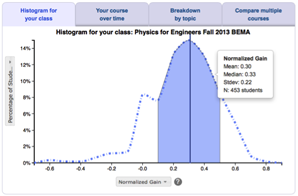Developed by Sam McKagan, Kathy Perkins, and Carl Wieman
| Purpose | To measure the effectiveness of different teaching methods at improving students’ conceptual understanding of quantum mechanics, and to use such measurements to improve their teaching. |
|---|---|
| Format | Multiple-choice |
| Duration | 20 min |
| Focus | Modern / Quantum Content knowledge (wave functions, probability, wave-particle duality, uncertainty principle, infinite square well, one-dimensional tunneling, energy levels) |
| Level | Intermediate |
Sample question from the QMCS:
QMCS Implementation and Troubleshooting Guide
Everything you need to know about implementing the QMCS in your class.
Login or register to download the implementation guide.
The Colorado Science Education Initiative (SEI) has developed a wide range of curricular materials for teaching sophomore-level modern physics, of which the QMCS is only one. Please visit the course website for other materials such as group activities, clicker questions, and homework.
more details
This is the second highest level of research validation, corresponding to at least 5 of the validation categories below.
Research Validation Summary
Based on Research Into:
- Student thinking
Studied Using:
- Student interviews
- Expert review
- Appropriate statistical analysis
Research Conducted:
- At multiple institutions
- By multiple research groups
- Peer-reviewed publication
The multiple-choice questions on the QMCS were developed based on faculty interviews, a review of textbooks and syllabi, observations of students, and a literature review of known student difficulties. The initial set of questions was refined using student interviews with over 40 students and expert review. Further, the QMCS was given to over 1000 sophomore, junior, and graduate students and appropriate statistical analysis of reliability, difficulty and discrimination were conducted. Reasonable values were found for each. The QMCS has been tested with over 1000 students and results published in two peer-reviewed articles.
References
- L. Carr and S. McKagan, Graduate Quantum Mechanics Reform, Am. J. Phys. 77 (4), 308 (2008).
- L. Deslauriers and C. Wieman, Learning and retention of quantum concepts with different teaching methods, Phys. Rev. ST Phys. Educ. Res. 7 (1), 010101 (2011).
- S. McKagan, K. Perkins, and C. Wieman, Design and validation of the Quantum Mechanics Conceptual Survey, Phys. Rev. ST Phys. Educ. Res. 6 (2), 020121 (2010).
- S. McKagan and C. Wieman, Exploring Student Understanding of Energy through the Quantum Mechanics Conceptual Survey, presented at the Physics Education Research Conference 2005, Salt Lake City, Utah, 2005.
PhysPort provides translations of assessments as a service to our users, but does not endorse the accuracy or validity of translations. Assessments validated for one language and culture may not be valid for other languages and cultures.
| Language | Translator(s) | |
|---|---|---|
| Finnish | Risto Leinonen |  |
| Japanese | Atsushi Hatakeyama, Hiroto Ohta, Hiroyoshi Lang |  |
If you know of a translation that we don't have yet, or if you would like to translate this assessment, please contact us!
Score the QMCS on the PhysPort Data Explorer
With one click, you get a comprehensive analysis of your results. You can:
- Examine your most recent results
- Chart your progress over time
- Breakdown any assessment by question or cluster
- Compare between courses
| Typical Results | |||||||||||||||||||||||||||||||||||
|---|---|---|---|---|---|---|---|---|---|---|---|---|---|---|---|---|---|---|---|---|---|---|---|---|---|---|---|---|---|---|---|---|---|---|---|
Typical scores from McKagan et. al 2010:
|
The latest version of the QMCS, released in 2008, is version 2.0. The QMCS has gone through 13 different versions in the process of development, with many questions being eliminated, modified, or added based on research with students.





